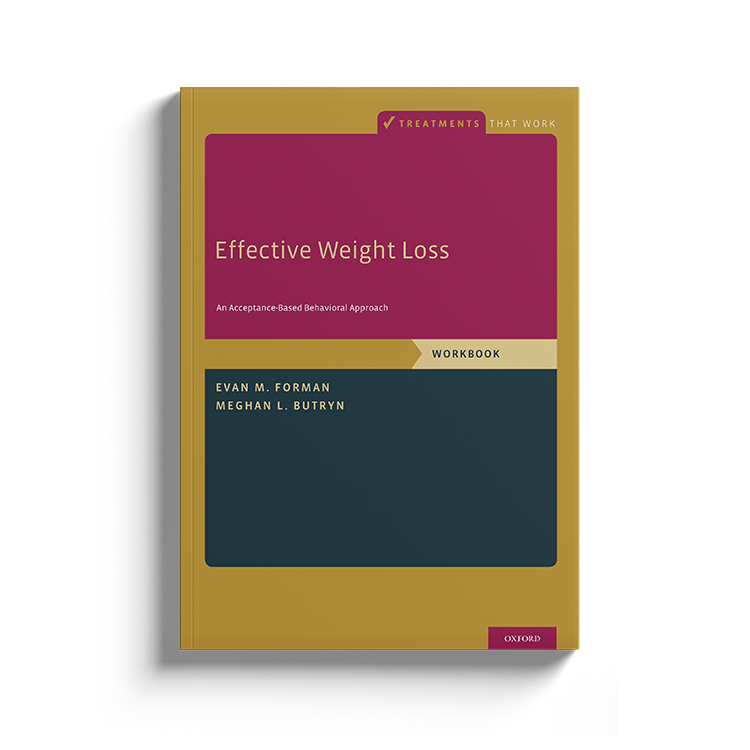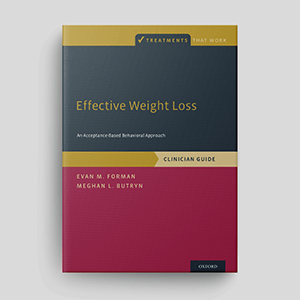Effective Weight Loss: An Acceptance-Based Behavioral Approach: Workbook
Effective Weight Loss is an evidence-based program designed to help clients achieve sustainable weight loss by integrating behavioral strategies with acceptance-based psychological techniques. This workbook guide presents a structured, session-by-session approach to facilitating long-term weight control in a way that aligns with clients' values. A therapist guide is downloadable separately.

Download or send

Overview
Effective Weight Loss provides a scientifically validated solution to the challenge of sustainable weight control. With over two-thirds of U.S. adults classified as overweight or obese, the health risks of excess weight, including heart disease and diabetes, are significant, yet long-term weight loss remains difficult to achieve. Written by Evan M. Forman and Meghan Butryn, this book introduces acceptance-based treatment (ABT), an innovative approach that builds on cognitive and behavioral principles while incorporating acceptance-based strategies to address the psychological and emotional barriers to weight management. By fostering psychological flexibility, ABT helps individuals make health-conscious, values-driven decisions even in the face of cravings or discomfort. Research shows ABT leads to greater and more lasting weight loss compared to traditional treatments, particularly for those prone to emotional eating or food cue reactivity. Combining proven behavioral tools like self-monitoring with strategies such as mindful decision-making and acceptance, this program offers a practical framework for achieving and maintaining meaningful weight loss.
Why use this resource?
Traditional weight loss programs often focus on behavior modification but neglect the psychological barriers that contribute to weight regain. This resource:
- Combines proven behavioral strategies with innovative psychological techniques.
- Helps clients develop long-term habits rather than relying on willpower alone.
- Addresses emotional and binge eating by enhancing awareness and acceptance.
- Supports sustained weight loss by integrating values-based decision-making.
Key benefits
Structured
Psychological
Behavioral
Long-Term
Trusted
What difficulties is this for?
Obesity
Clients with a BMI over 30 who seek structured behavioral support for weight loss.
Overweight
Clients with a BMI over 25 aiming to improve health outcomes.
Emotional Eating
Clients who engage in overeating in response to negative emotions or stress.
Integrating it into your practice
Assess
Evaluate clients' weight history, motivations, and barriers to change.
Educate
Teach clients about energy balance, self-monitoring, and effective goal setting.
Commit
Help clients clarify values and set realistic, meaningful weight loss goals.
Monitor
Use food records, weight tracking, and behavioral logs to ensure adherence.
Adjust
Modify interventions based on client progress and emerging challenges.
Prevent
Implement relapse prevention strategies and long-term maintenance plans.
Theoretical background and therapist guidance
Weight control is a significant health concern, with over two thirds of adults in the United States classified as overweight or obese. Obesity increases the risk of heart disease, diabetes, cancer, and reduced quality of life. Even a modest 5% weight loss can improve health markers like blood pressure, glycemic control, and cholesterol levels (Goldstein, 1992). However, sustaining weight loss is difficult. While diet programs can lead to short-term results (3–6% weight loss at 12 months; Tsai & Wadden, 2005), fewer than 20% of participants maintain a 10% weight loss after one year. The modern environment, filled with calorie-dense foods and sedentary habits, makes lasting weight control particularly challenging.
Cognitive-behavioral treatments for weight loss focus on calorie tracking, portion control, and exercise planning, offering important tools for weight management. However, these methods often fall short because they don’t address the psychological and emotional drivers of eating behavior. Many individuals struggle with cravings, emotional eating, and a biological predisposition toward conserving energy. Without strategies to manage these challenges, long-term adherence to cognitive behavioral treatments recommendations can be difficult, and weight regain becomes common.
Effective Weight Loss: An Acceptance-Based Behavioral Approach introduces acceptance-based treatment (ABT), which builds on cognitive and behavioral principles, incorporating acceptance-based strategies to enhance long-term success. ABT emphasizes psychological flexibility—the ability to make choices aligned with long-term goals despite discomfort or cravings. Studies show that ABT leads to greater and more sustainable weight loss compared to CBT alone, especially for individuals prone to emotional eating or reactivity to food cues (Forman et al., 2013). By combining proven behavioral tools like self-monitoring with acceptance strategies, ABT helps individuals overcome both external and internal barriers to weight loss.
The program includes two books:
- Effective Weight Control: An Acceptance-Based Behavioral Approach: Clinician Guide
- Effective Weight Control: An Acceptance-Based Behavioral Approach: Workbook
Authored by leading psychologists including David Barlow, Michelle Craske and Edna Foa, Treatments That Work™ is a series of manuals and workbooks based on the principles of cognitive behavioral therapy (CBT). Each pair of books – therapist guide and workbook – contains step by step procedures for delivering evidence-based psychological interventions and will help you to provide the best possible care for your clients.
At Psychology Tools, we are proud to make many of the Treatments That Work™ titles available to our members. Each book is available to download chapter-by-chapter, and Psychology Tools members with a currently active subscription to our ‘Complete’ plan are licensed to share copies with their clients.

What's inside
- A session-by-session guide detailing structured interventions across 25 weeks.
- Client worksheets and exercises to reinforce weight control skills.
- Meal planning tools to improve adherence to nutritional goals.
- Behavioral strategies for managing cravings, emotional eating, and sedentary habits.
- Long-term maintenance techniques to prevent weight regain.
FAQs
How this resource helps improve clinical outcomes
- Enhances self-monitoring skills and calorie awareness.
- Supports clients in overcoming psychological barriers to weight loss.
- Provides a structured yet flexible approach to long-term behavior change.
- Encourages sustainable lifestyle modifications rather than short-term dieting.
Therapists benefit from:
- A structured program that integrates ACT and behavior modification principles.
- Evidence-based techniques to enhance weight loss adherence.
- Practical tools for monitoring progress and addressing setbacks.
References and further reading
- Butryn, M. L., Webb, V., & Wadden, T. A. (2011). Behavioral treatment of obesity. The Psychiatric Clinics of North America, 34(4), 841.
- Catenacci, V. A., Grunwald, G. K., Ingebrigtsen, J. P., Jakicic, J. M., McDermott, M. D., Phelan, S., ... Wyatt, H. R. (2011). Physical activity patterns using accelerometry in the National Weight Control Registry. Obesity, 19(6), 1163–1170.
- Church, T. S., Thomas, D. M., Tudor-Locke, C., Katzmarzyk, P. T., Earnest, C. P., Rodarte, R. Q., ... Bouchard, C. (2011). Trends over 5 decades in U.S. occupation-related physical activity and their associations with obesity. PLoS ONE, 6(5), e19657.
- Diliberti, N., Bordi, P. L., Conklin, M. T., Roe, L. S., & Rolls, B. J. (2004). Increased portion size leads to increased energy intake in a restaurant meal. Obesity Research, 12(3), 562–568.
- Forman, E. M., Butryn, M. L., Hoffman, K. L., & Herbert, J. D. (2009). An open trial of an acceptance-based behavioral treatment for weight loss. Cognitive and Behavioral Practice, 16, 223–235.
- Forman, E. M., Butryn, M. L., Juarascio, A. S., Bradley, L. E., Lowe, M. R., Herbert, J. D., & Shaw, J. A. (2013). The Mind your Health project: A randomized controlled trial of an innovative behavioral treatment for obesity. Obesity, 21(6), 1119–1126.
- Forman, E. M., Butryn, M. L., Manasse, S. M., Wyckoff, E. P., & Goldstein, S. P. (2016, April). Acceptance-based behavioral weight loss treatment outperforms standard BT: Outcomes from the Mind Your Health study. Paper presented at the 37th Annual Meeting and Scientific Sessions of the Society of Behavioral Medicine, Washington, D.C.
- Forman, E. M., Hebert, J. D., Moitra, E., Yeomans, P. D., & Geller, P. A. (2007). A randomized controlled effectiveness trial of acceptance and commitment therapy and cognitive therapy for anxiety and depression. Behavior Modification, 31(6), 772–799.
- Franz, M. J., VanWormer, J. J., Crain, A. L., Boucher, J. L., Histon, T., Caplan, W., ... Pronk, N. P. (2007). Weight-loss outcomes: A systematic review and meta-analysis of weight-loss clinical trials with a minimum 1-year follow-up. Journal of the American Dietetic Association, 107(10), 1755–1767.
- French, S. A., Story, M., & Jeffery, R. W. (2001). Environmental influences on eating and physical activity. Annual Review of Public Health, 22, 309–335.
- Goldstein, D. J. (1992). Beneficial health effects of modest weight loss. International Journal of Obesity and Related Metabolic Disorders, 16(6), 397–415.
- Gifford, E. V., Kohlenberg, B. S., Hayes, S. C., Antonuccio, D. O., Piasecki, M. M., Rasmussen-Hall, M. L., & Palm, K. M. (2004). Acceptance-based treatment for smoking cessation. Behavior Therapy, 35(4), 689–705.
- Gregg, J. A., Callaghan, G. M., Hayes, S. C., & Glenn-Lawson, J. L. (2007). Improving diabetes self-management through acceptance, mindfulness, and values: A randomized controlled trial. Journal of Consulting and Clinical Psychology, 75(2), 336–343.
- Hayes, S. C., Luoma, J. B., Bond, F. W., Masuda, A., & Lillis, J. (2006). Acceptance and commitment therapy: Model, processes, and outcomes. Behaviour Research and Therapy, 44(1), 1–25.
- Hayes, S. C., Strosahl, K. D., & Wilson, K. G. (1999). Acceptance and commitment therapy: An experiential approach to behavior change. New York, NY: Guilford Press.
- Niemeier, H. M., Leahey, T., Palm Reed, K., Brown, R. A., & Wing, R. R. (2012). An acceptance-based behavioral intervention for weight loss: A pilot study. Behavior Therapy, 43(2), 427–435.
- Raynor, H. A., & Epstein, L. H. (2001). Dietary variety, energy regulation, and obesity. Psychological Bulletin, 127(3), 325–341.
- Tsai, A. G., & Wadden, T. A. (2005). Systematic review: An evaluation of major commercial weight loss programs in the United States. Annals of Internal Medicine, 142(1), 56–66.
- Veehof, M. M., Oskam, M. J., Schreurs, K. M., & Bohlmeijer, E. T. (2011). Acceptance-based interventions for the treatment of chronic pain: A systematic review and meta-analysis. Pain, 152(3), 533–542.
- Wing, R. R., Lang, W., Wadden, T. A., Safford, M., Knowler, W. C., Bertoni, A. G., ... Wagenknecht, L. (2011). Benefits of modest weight loss in improving cardiovascular risk factors in overweight and obese individuals with Type 2 diabetes. Diabetes Care, 34(7), 1481–1486.
Just enter your name and email address, and we'll send you Effective Weight Loss: An Acceptance-Based Behavioral Approach: Workbook (English US) straight to your inbox. You'll also receive occasional product update emails wth evidence-based tools, clinical resources, and the latest psychological research.
Product
Company
Support
- © 2026 Psychology Tools. All rights reserved
- Terms & Conditions
- Privacy Policy
- Cookies Policy
- Disclaimer
Working...
We value your privacy
This site uses strictly necessary cookies to function. We do not use cookies for analytics, marketing, or tracking purposes. By clicking “OK”, you agree to the use of these essential cookies. Read our Cookie Policy


